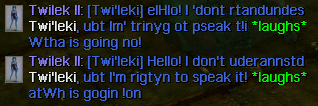SWLOR features an intricate chat and language system that merits a written guide.
Chat System
Most of the chat channels are the same as the base game, with the following exceptions:
- Shout has been replaced by the Holonet. The Holonet broadcasts a planet-wide message to all players. Reading this channel can be toggled by using the /holonet chat command.
- Party chat has been replaced by comms. Comms are very similar to party chat, but with one exception - messages broadcast by you in the Comms channel are audible to proximity, just like in the talk channel. Messages received by you are unaffected. To illustrate this, imagine character A and B in the same party but different areas, and character C standing next to character A. When character A broadcasts a message in the comms channel, both character B and character C will hear it. When character B broadcasts a message in the comms channel, only character A will hear it.
It should be noted that all chat channels, except for tells and DM, are considered In Character channels. Out of Character chat is supported on In Character channels by prefixing your message with ‘//’, but this is discouraged - please try to keep OOC chat to tells.
Language System

A droid speaking/beeping
Those of you who are familiar with Arelith’s language system may recognise many of the mechanics. However, there are substantial differences which should be noted.
Every race starts with a racial language. Some backgrounds may confer additional languages. Players can learn languages by hearing them spoken by other characters, including NPCs. This progress is time limited to prevent abuse.
To select a language, use the /language chat command. Any subsequent message sent after choosing a language will be spoken in that language. To return to “normal”, switch your language to Basic.
All text you sent - except for emotes - will be translated into the language you have chosen when you send them. If there is a phrase you wish not to be translated (for example, a character name) surround it in square brackets like so: Hello [Bob]! How are you doing? I heard you started dating [Jane].
A number of emote styles are supported, which we categorise under two styles:
- Normal style. Emotes in this format are supported:
*nods*::nods::[[nods]](note: this comes out as [nods] in the game, but you must double bracket it to differentiate between the square bracket language exclusion outlined earlier) - Novel style. Emotes in this format are supported:
"Hello!", she said.
By default, players are set into normal style. To switch between the styles, use the /emotestyle chat command.
When hearing a language that you are not completely fluent in, you may mishear one or more words, depending on how well you understand the language. Similarly, when speaking a language you aren’t completely fluent in, you may mispronounce certain words.
Here are a few examples of what this might look like:

Trying to speak when not fluent

Trying to understand when not fluent
